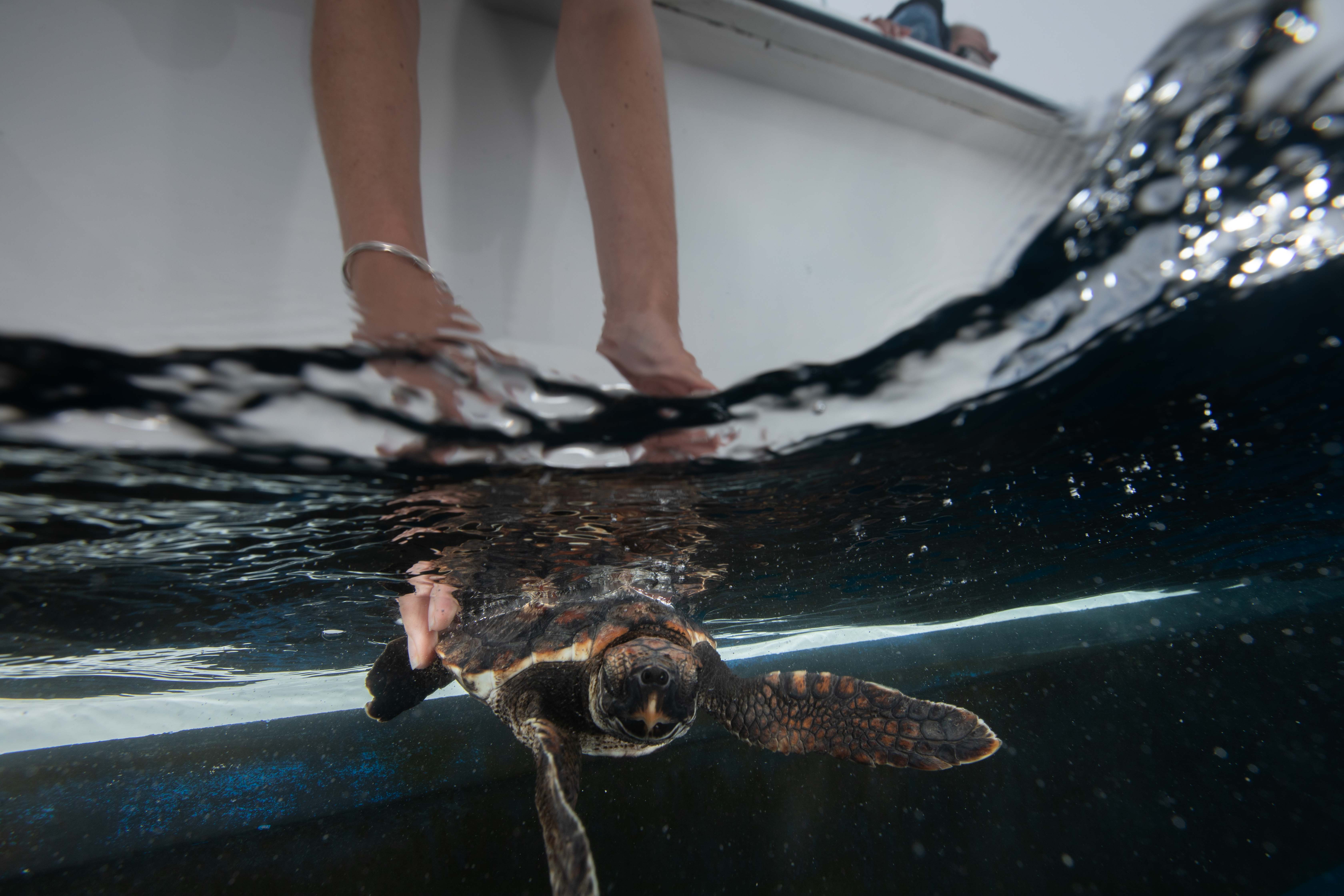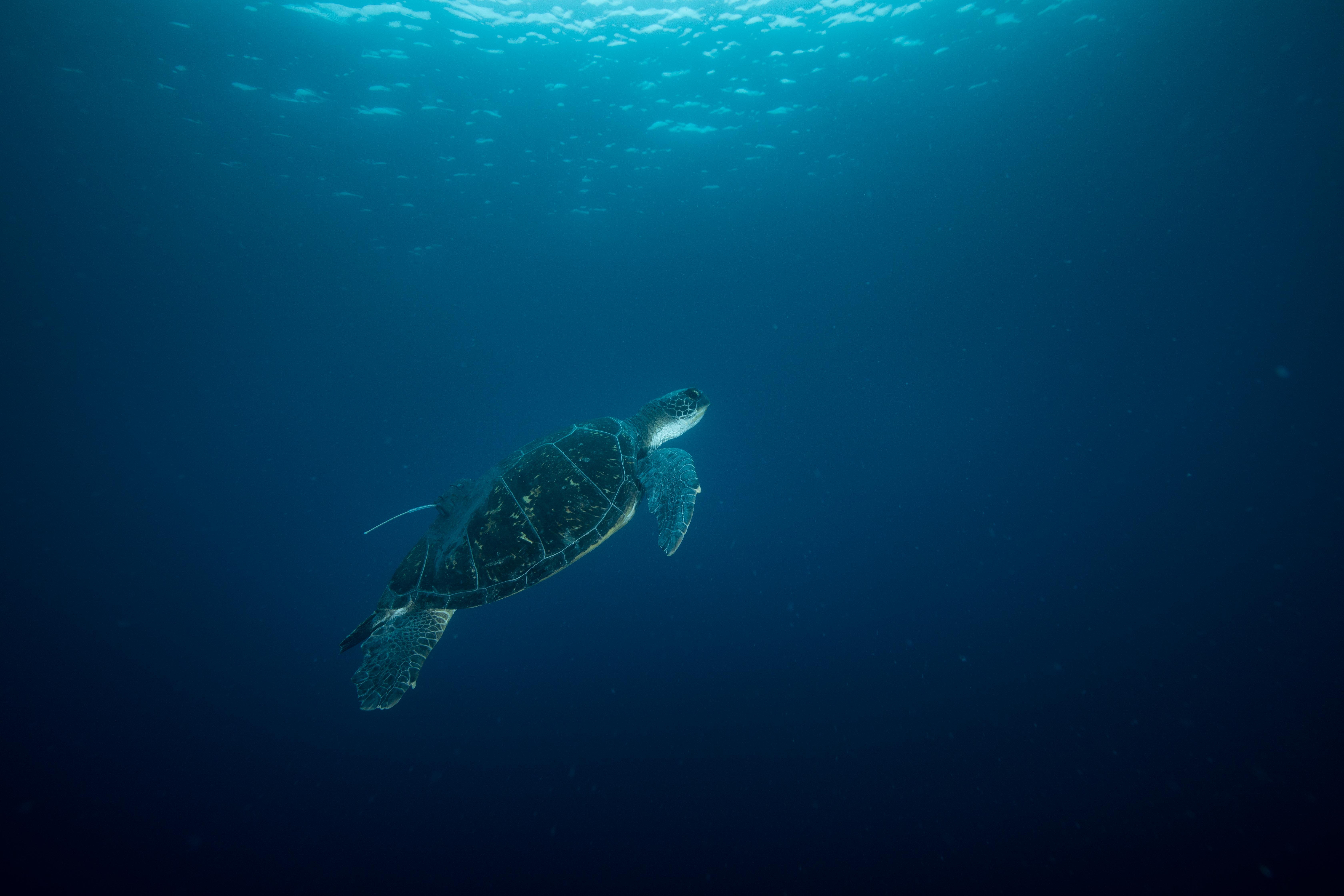The turtles were all rehabilitated at the Two Oceans Aquarium over the last couple of months after being found stranded on Western Cape beaches.
Western Cape, South Africa (18 January 2022) – On 17 January 2022, the sea turtle rehabilitation team of the Two Oceans Aquarium Education Foundation released 44 rehabilitated sea turtles approximately 30 nautical miles south of Hout Bay.
The turtles were all rehabilitated at the Two Oceans Aquarium over the last couple of months after being found stranded on Western Cape beaches. The group that was released included Geri, the three-flippered green sea turtle that has been recovering in the I&J Ocean Exhibit for the last couple of weeks.
After months of rehabilitation, the turtles were cleared for release by the vet, with some tagged with satellite tags to enable the animals to be tracked and others tagged with microchips, similar to those used for house pets. On the morning of the release, all the turtles were packed into travel crates, transported to Hout Bay harbour and loaded onto two boats. The team and crew headed out about 30 nautical miles in order for them to encounter the warmer currents that can be found south of Cape Town during the summer months.
Once these temperate waters were reached, the turtles were released to the great joy and jubilation of all on board.
Which turtles were released?
This release included 40 post-hatchling loggerhead turtles. These little ones weighed between 300g and 1,2kg. Loggerhead turtles nest on northern KwaZulu-Natal beaches, and the eggs hatch during December and January every year. Once hatched, the tiny turtles make their way into the Indian Ocean and start to drift with the Agulhas Current. The Current carries them south towards Cape Town. At about Struisbaai, the Current doubles back on itself, heading north again. Along the way, and at the Current’s turning point, strong winds and rough seas push some of the tiny turtles into the colder surrounding waters. Being reptiles and therefore having body temperatures that adjust to ambient water temperature, the cold water causes the turtles to go into cold shock and hypothermia. These compromised and often injured little turtles are expelled onto the beaches, where concerned members of the public find them and bring them to the Two Oceans Aquarium for specialised care and rehabilitation.

Juvenile and sub-adult sea turtles are also admitted to the rehabilitation programme. Unlike the post-hatchlings that can often be found stranded in concentrated areas, juvenile and sub-adult sea turtles strand all along the Western Cape beaches. The turtles are given appropriate medical care and are fed a specialised diet until they are cleared for release. Rehabilitation can take a couple of months or even years. Five of the seven turtle species found worldwide have been rehabilitated by the Two Oceans Aquarium Education Foundation sea turtle rehabilitation programme.
Geri, the three-flippered green turtle
Geri was found stranded at Paternoster on 25 July 2021. The three-flippered turtle was brought to the Aquarium by Tracy Whitehead, who is the coordinator of the Aquarium Foundation’s turtle rescue network (a group volunteer organisations and individuals). Weighing 48kg, the green turtle had an old, healed injury that had resulted in the amputation of one of its front flippers. The turtle also had a number of other external injuries, which were immediately treated. Through dedicated care, Geri has made a full recovery and has already adapted well to life with only three flippers. Geri has been tagged with a satellite tag provided by the Department of Forestry, Fisheries and Environment and will be monitored for as long as the tag remains active.
Harry (sub-adult green turtle)
Harry was found at Stilbaai on 21 October 2020. The turtle was incredibly ill, suffering from shell rot, severe wounds and gut stasis. Specialised medication eventually managed to get its gut moving again, which resulted in the expelling of a piece of plastic that had been consumed while in the ocean. Harry’s recovery was slow, but he was eventually moved into the I&J Ocean Exhibit to enjoy more space and to facilitate his faster recovery.
Litchi
Litchi was found on 22 February 2021 at De Hoop Nature reserve. The turtle weighed 7kg and was in good condition, except for the multiple marine leeches attached to it. The turtle responded to the rehab process very well, and although she showed signs of “bubble butt”, the condition cleared up quickly.
Echo (juvenile hawksbill turtle)
Echo is a juvenile hawksbill turtle that was found washed up and half-buried on the beach at Struisbaai on 20 October 2021. Through networking with the NSRI, the turtle was brought to the Aquarium, where it was found that, even though it looked quite bad and was covered in algae, it was strong and fairly healthy. The rehabilitation team do not often see hawksbill turtles for rehabilitation, but Echo was one of five brought in this year. Echo was the only one strong enough to recover. Hawksbills are critically endangered, and Echo’s recovery and release is incredibly important for the species.
Turtle rehabilitation at the Two Oceans Aquarium
Each year, the Two Oceans Aquarium Education Foundation turtle rehabilitation programme receives a number of sea turtles that strand along the Western Cape coastline. These turtles range in size from just a couple of grams to many kilogrammes. They all receive rehabilitation treatment for various injuries and illnesses – from external wounds and dehydration to hypothermia and infection. Many of the turtles also present with intestinal problems, which more often than not can be attributed to the ingestion of plastic. (71% of the post-hatchlings brought in for rehabilitation this year had ingested plastic).
After months of specialised medical care, which includes wound treatments, antibiotics, x-rays, tube feeding, specialised diets, and in some cases MRIs, the turtles are cleared for release. The release coincides with the warmer waters of the Indian Ocean pushing in closer to the coast off of Hout Bay during peak summer. By releasing the turtles in this area, they are able to join the warmer current again and continue with their life at sea. In order for the rehabilitation team to track some of the larger turtles, they are fitted with satellite tags before release.
Even after months of rehabilitation, some of the sea turtles are not healthy enough to be released. Although 44 turtles were released, a number of others remain in the rehabilitation programme. These include three post-hatchling loggerhead turtles, three juvenile loggerhead turtles, Nobomvu (sub-adult loggerhead turtle), three sub-adult loggerhead turtles, and Bob, a green turtle that has been at the Aquarium since 2014 and is still undergoing rehabilitation.
Bob’s story of overcoming severe illness and the ingestion of plastic inspired extreme athlete and long-distance runner Karoline Hanks to run the 13 Peaks Challenge back-to-back to raise funds for a satellite tag for Bob. She managed to successfully and triumphantly complete the gruelling 212km. You can help Karoline to reach her goal of raising R70 000 by donating here.
The Two Oceans Aquarium Education Foundation is the NPO/PBO partner of the Two Oceans Aquarium. The Foundation relies on donations to continue its work in conservation, education and research. Please visit www.aquariumfoundation.org.za to learn more about their work and to donate and support.


